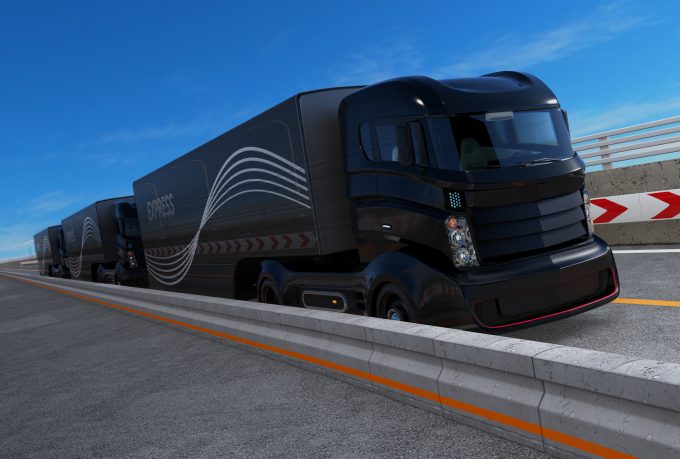UK government 'just pandering' to UK logistics with budget gifts
As it lumbers from chaos to farce, Britain’s government seems to want to woo the ...
GM: RAISING THE ROOF GGM: IN FULL THROTTLE GZIM: MAERSK BOOST KNIN: READ-ACROSSMAERSK: NOT ENOUGHMAERSK: GUIDANCE UPGRADEZIM: ROLLERCOASTERCAT: HEAVY DUTYMAERSK: CATCHING UP PG: DESTOCKING PATTERNSPG: HEALTH CHECKWTC: THE FALLGXO: DEFENSIVE FWRD: RALLYING ON TAKEOVER TALKODFL: STEADY YIELDVW: NEW MODEL NEEDEDWTC: TAKING PROFIT
GM: RAISING THE ROOF GGM: IN FULL THROTTLE GZIM: MAERSK BOOST KNIN: READ-ACROSSMAERSK: NOT ENOUGHMAERSK: GUIDANCE UPGRADEZIM: ROLLERCOASTERCAT: HEAVY DUTYMAERSK: CATCHING UP PG: DESTOCKING PATTERNSPG: HEALTH CHECKWTC: THE FALLGXO: DEFENSIVE FWRD: RALLYING ON TAKEOVER TALKODFL: STEADY YIELDVW: NEW MODEL NEEDEDWTC: TAKING PROFIT

Trials of semi-automated trucks will begin on Britain’s roads next year after the government agreed an £8.1m investment.
The Department for Transport (DfT) and Highways England has commissioned TRL to lead the trials, with participation from DAF Trucks, Ricardo, and DHL.
Transport minister Paul Maynard says the government believes the technology could reduce fuel bills and emissions and result in less congestion.
“We are investing in technology that will improve people’s lives,” said Mr Maynard. “But first we must make sure it is safe and works on our roads.”
“Platooning” connects convoys of trucks by vehicle-to-vehicle communication, allowing them to effectively operate as a single unit – steering, accelerating and braking simultaneously.
While each will have a driver ready to take control at any time, the trial will see three-truck convoys controlled by a lead vehicle on regular DHL logistics operations, with driver training and test track trials expected over the coming months.
Academy director at TRL Richard Cuerden said platooning technology had the potential to deliver a wide range of benefits to all road users.
“The trials will highlight the services platooning may offer and if they can safely reduce vehicle emissions and improve journeys and economic prosperity,” he said.
The decision to give the go-ahead for trials follows the launch of a government consultation on the introduction of driverless vehicles on UK roads earlier this year.
Responding to the news, the Freight Transport Association said it was imperative government moved forward quickly and efficiently to enable the logistics sector to plan for the future.
Head of national policy Christopher Snelling said: “Driving closely together, platoons of trucks take up less space on the road, and travelling at constant speeds can help improve traffic flows and reduce tailbacks.
“The sooner the trial occurs, the sooner the logistics industry, which represents 11% of the UK’s non-financial business economy, can know if this will be the right route for the future.”
Despite welcoming any developments to the UK’s road freight sector, chief executive of the Road Haulage Association (RHA) Richard Burnett questioned the trial’s focus.
“Currently it seems to be on the technology; safety has to come first and it cannot be compromised,” said Mr Burnett.“It is crucial this element of the concept gets the highest priority.
“The RHA will follow these trials very carefully and make its views heard in the consultation that follows.”
The UK is not the first country to eye driverless vehicles to improve supply chain efficiency, the technology is in use across Australia’s mining industry. And at the start of the year, PSA and Singapore’s Ministry of Transport signed an agreement with Scania and Toyota for the design, development and trial of a truck platooning system.
These will take place in two phases over three years to 2019 and will involve the transport of containers between port terminals.
Initial testing will be conducted by Scania and Toyota, with the ministry and PSA selecting one of them to conduct local trials and develop the technology in Singapore, where ways to tackle a manpower shortage and shift more movement of freight to nights to reduce traffic congestion are being explored..
Comment on this article